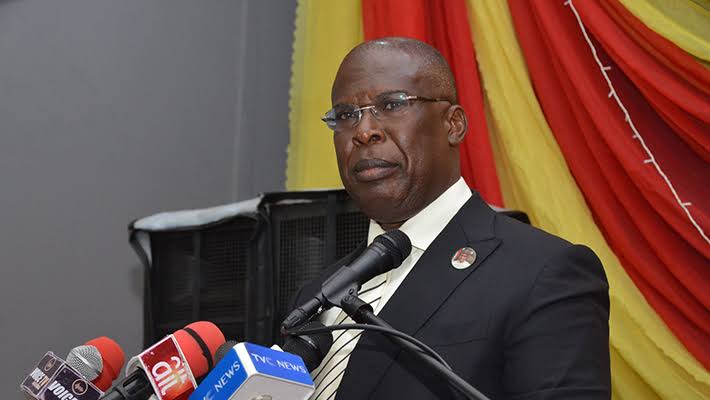- INEC had, earlier today, released amended list of candidates vying in the election without including Sylva’s name
- Unsatisfied with the judgment, Sylva approached the Court of Appeal
Mr Ahmed Raji, SAN, has written to the Independent National Electoral Commission (INEC), demanding immediate withdrawal of the amended list of candidates released for the poll.
Raji, who is counsel to Chief Timipre Sylva, the All Progressives Congress (APC)’s candidate in the Nov. 11 Bayelsa election, described the decision of the electoral umpire as prejudicial.
The News Agency of Nigeria (NAN) reports that INEC had, earlier today, released amended list of candidates vying in the election without including Sylva’s name.
Justice Donatus Okorowo of a Federal High Court, Abuja, had, on Oct. 9 in a judgment , disqualified Sylva, a former governor of the state, from contesting the election.
Unsatisfied with the judgment, Sylva approached the Court of Appeal, through his layer, Raji, to challenge the decision of the court.
But while the appeal is pending, INEC released list of candidates for the poll excluding the APC candidate’s names.
In a letter to the commission dated Oct. 25, Raji said he had the firm instruction of Sylva to respectfully demand for the immediate withdrawal of the amended list.
The senior lawyer said it was shocking for the INEC to release such publication when the judgement the commission acted upon had already been appealed against at the Court of Appeal. .
“Dear sir, you will recall that the judgment in issue, that arose from the above suit was delivered on the 9th October,2023 and our client, being an ardent and firm believer in the efficacy of the judiciary and the rule of law, immediately filed an appeal within 24 hours of the judgment, on the 10th October, 2023.
“In addition to the notice of appeal, our client expeditiously compiled the record of appeal and transmitted same in less than 10 days.
“The appeal was successfully entered on the 18th October, 2023, with Appeal No. CA/ABJ/CS/1060/2023.
“The above being the case, the commission, as a respected arbiter and law abiding institution, is expected to respectfully wait for the outcome of the appeal, before taking any step that may be prejudicial to any of the parties, particularly, our client.
“This is in view of the fact that the parties that went to court are not candidate in the forthcoming election, unlike our client. In other words, they do not have anything to lose, rather, they are fighting proxy battles to deny our client and his party the opportunity to participate in the forthcoming election.
“We know that the Commission has always been consistent in a matter like this, to wait until the entire appellate process and proceedings are completed, one way or the other,” he said.
According to him, this is not only consistent with the administrative and policy convenience but also with the Electoral Act and the constitution, in all election related matters.
NAN reports that the Court of Appeal in Abuja, has scheduled hearing for Friday in the appeal filed by Slyva.Sylva and APC are, by their suits, praying the Court of Appeal to set aside the Oct. 9 judgment by Justice Okorowo , voiding Sylva’s candidacy.
Sylva, in his three-ground notice of appeal, is contending among others that the trial court erred in law and and occasioned a grave miscarriage of justice when it wrongly assumed jurisdiction by delving into the internal affairs of his party, which is a non-justiciable cause of action
He stated that the trial court has a duty to understand the case presented by the parties and apply the law correctly.
Sylva contended that the trial judge erred in law and occasioned a grave miscarriage of justice against him when he (the judge) wrongly conferred, allowed and adjudicated on the matter when the respondent (plaintiff at the trial court) has no locus standi to initiate or institute the action.
He argued that the plaintiff had agreed that he did not participate in the primary election that produced him as the governorship candidate of the APC.
Sylva also argued that the trial court breached his right to fair hearing as guaranteed by the Constitution when it failed to properly evaluate, determine and pronounce on his notice of preliminary objection, with which he challenged the competence of the suit.
